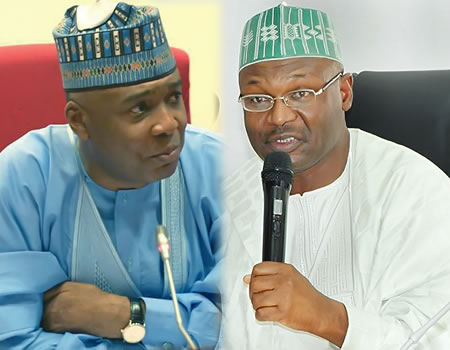There have been widespread clamour for a commission or tribunal to specifically handle electoral offences in the country. After every election season, the Independent National Electoral Commission (INEC) is saddled with a plethora of cases of misdemeanor during elections. These are spread among politicians, citizens, INEC officials and security operatives. With the experience each passing year, it became obvious that the electoral body cannot shoulder the prosecution of electoral offenders as part of its current schedules.
In order to deal with that issue ahead of the 2019 election, the Senate started work on the passage into law of an Electoral Offenses Commission bill, which would see to the establishment of an Electoral Offences Tribunal to specifically handle electoral offences.
The aim of the bill is to help reduce to the barest minimum incidences of electoral activities that have violated the electoral process in the country. The bill will, when it comes to effect, enable the Commission with the power to arrest, investigate and prosecute all offenders. The bill has as its origins in two previous reports, the Uwais Report of 2008 and Lemu Report of 2011. Therefore when Senator Abubakar Kyari sponsored it on the floor of the Senate, the lawmakers were largely of the view that the bill was long overdue. It was reported that almost all elections held in the country were marred with malpractices and violence with offenders walking away freely as there was no law to punish them.
The incidences following the general election of 2011 became handy where a number of corps members lost their lives due to violence orchestrated after the elections. At the public hearing held at the new Senate wing, stakeholders submitted that the bill was coming at the right time. They also spoke in favour of the establishment of the Commission to oversee the crime.
Many were of the view that the various roles assigned to the Independent National Electoral Commission (INEC), which includes voter registration, registration of political parties, party monitoring as well as organization and operation of political parties, delineation of constituencies and conduct of elections among others were more than a burden the electoral commission could cope with effectively.
When Senator Abubakar Kyari. (Borno North) spoke during the public hearing he said that electoral offenders should know that henceforth they would be punished. Kyari stated that the intention of this bill was to curtail, cure and prevent a culture of electoral offences with impunity and violence that allowed election riggers and offenders take control of governments or occupy elective public offices against the democratic will of the electorate.
According to him, “INEC is not clearly enabled to prosecute alleged offenders unless otherwise determined by a tribunal. More significantly with less than 100 legal officers and other operational deficiencies, INEC clearly does not have the required capacity to prosecute electoral offences committed across Nigeria’s 119,973 polling units, 9,572 wards, 360 federal constituencies, 109 senatorial districts and 774 local government areas. Indeed INEC has itself admitted that it lacks the wherewithal to cleanse the system hence its inability or failure to prosecute even one per cent of the 870,000 electoral offences allegedly committed during the 2011 general election.”
The chairman of Senate Committee on INEC, Senator Suleiman Nazif said that the gathering was aimed at affirming the collective contributions toward advancing the discourse on free, credible and acceptable election by ensuring the existence of enabling circumstances that would help deepen democracy.
“Certainly, over the years statistics had shown that various offences and crimes orchestrated by numerous politicians have cast a shadow over the nation’s electoral process. Today, we are all gathered here to add our voices in search of solutions to that effect,” he said.
The lawmaker stressed that the bill was important to the nation’s electioneering process adding that in view of its significance, stakeholders and therefore urged a robust debate and insightful deliberations so that wider perspectives could be gleaned from Nigerians. The national chairman of INEC, Professor Mahmood Yakubu, who spoke on the bill, said that the commission had secured over sixty convictions and prosecuted over one thousand electoral offenders immediately after the 2015 general election. He said that the commission had also prosecuted over one hundred and twenty four cases.
But he said that the convictions were a far cry from the large number of electoral offenders adding that there were some reasons militating against the inadequate prosecution of electoral offenders. He said that one of the problems was the huge prosecutorial task and the dependence on other agencies for arrest and investigation, time and resources against the backdrop of INEC’s extensive responsibilities of conducting elections and managing pre-and post elections litigations.
According to him, failure to systematically and consistently “enforce sanctions has encouraged impunity and the violence that often characterised electoral contest in Nigeria thereby subverting the will of the people and undermining the nation’s electoral democracy.”
Yakubu further said that at present INEC was saddled with the responsibility of prosecuting electoral offenders. He stated that Section 150 (1) and (2) of the Electoral Act 2010 (as mended) empowers INEC to prosecute electoral offenders through its legal department but that the commission was not enabled with the power of arrest and investigation. He said that the commission had to depend on the police for such critical aspects of investigation.
He declared that without the capacity to make arrest and investigate violations, the prosecutorial role would be hampered stressing the bill was seeking to establish the National Electoral Offences Commission by addressing issues relating to coordination and enforcement of all laws relating to electoral offences and adoption of measures to deal with electoral offences.
He said however that the proposed composition of the commission was heavily tilted towards ex officio representation. He said that out of the 17 members on the board, 12 would be drawn from existing agencies leaving only the chairman and four special members appointed on special recognition or merit. “There is no representation of special action groups that have over the years observed elections and built a body of knowledge/data on how the electoral process is subverted. The composition of the commission should be reviewed to more specifically leverage on persons of such experience,” he said.
He further observed that Section 2(1) (a) (I) of the bill makes the chairman of the commission the chief executive and accounting officer. He however submitted that in accordance with Section 20(1) and 60 of the public procurement Act 2007, the accounting officer should be the secretary who is charged with line supervision of the conduct of procurement processes.
Yakubu further noted that Section 12 (1) (a) of the bill provides for the establishment of investigation, legal and prosecution unit. He submitted that the “proposed legal unit with functions of prosecution be separated from investigation in view of the fact that one is serving the other. In the same vein all units of the commission in the bill should be renamed as departments with units under them. This will provide for a better and more effective organisational structure and coherence. To give room for greater independence of the commission as envisaged in the bill, the appointment of the secretary of the commission should be made by the commission and not the president. Although Section 8 (2) (d) subjects the secretary to the commission to the supervision and control of the chairman, experience has shown that there is always a difficult relationship in reality, especially since both of them are presidential appointees.”
When the highlights in the bill become law and the commission becomes reality, it is hoped that the business of election in Nigeria won’t be the same again as electoral offenders should be in for some trouble.
The bill defines bribery as a key electoral offence which carries 15 years jail term. It defines the offence thus: “A person is guilty of offence of bribery who directly or directly gives, lends or agrees to give or lend or offer, promise or promises to procure or to endeavor to procure any money or valuable considerations to induce any voter, to give or refrain from giving his vote for such a person is liable for a term of at least 15 years.
Section (23) (2) states that any person who commits an act in contravention of subsection of the section shall be guilty of an offence of serous practice and on conviction, liable to imprisonment for a term of at least fifteen years or fine of at least thirty million or both.
According to the bill, any person, who shall disturb the processes three hours to commencement of an election or after the completion of the election by either obstructing voters or the electoral officers shall be guilty of an offence and found liable to a term of at least six months or a fine of at least one hundred thousand naira or both.
The bill further indicates that any candidate or agent or any person who shall grab, loot, damage or destroy in any manner ballot boxes or ballot papers or any other electoral document or material before, during or after an election without the permission of election official in charge of the election at a polling station or election official in charge of materials would be liable to a conviction of twenty years imprisonment or a fine of at least forty million naira.






